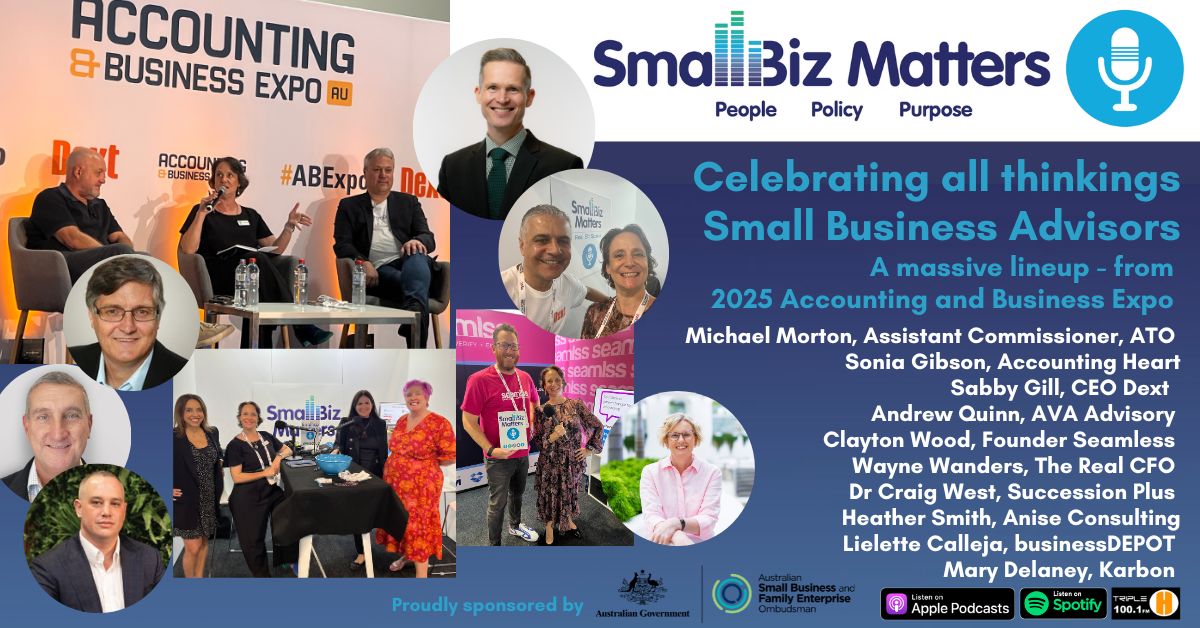Identifying Phases - 3/7/2018
| Tuesday July 3Small Biz Matters – a half hour program each week where you can work ON your business rather than IN it.
with Alexi Boyd from Boyd Office Management Services
Date: 3 July 2018
The Small Biz Journey can be broken down in logical life cycles and it can often be useful to identify where you are in that journey. Why? So you can identify to pitfalls which other businesses in that same position often face. It helps to avoid making the same mistakes as other!
Our guest today is Salmin Khan, an expert in business advice in particular around the area of insolvency. He understands through his work with a great range of businesses; big and small what are the common problems, mistakes and solutions that business owners face at each stage.
Welcome to the show Salmin.
Topics we’ll be covering:
-
Ideally, the mindset should be that running a business is just a process of solving problems for yourself and your customers.
StartUp Stage
-
At the startup stage, business owners will have a lot of enthusiasm but little direction and even less experience. The problem that they need to solve will be how to bring the first sales in, how to establish a presence in the market and how to build a product offering.
-
The common mistakes at this stage are to over invest in things such as company cars, stock and premises. Startups often suffer from a lack of planning on how to reach their first customers. What this will often lead to is a dwindling in enthusiasm and the venture fizzles out.
-
Common things we’ll hear at this point are “we just need to get the first few customers” or “we do it all”.
-
The solution to this is to start with a plan. It doesn’t have to be a fifty page document but you do need to sit down and figure out your product, demographic and unique selling point. You also want to minimise your cash drain.
-
A company will remain in the startup phase until they can commit to a set offering and systemise it.
Growth Phase
-
At the growth phase, the company now starts to bring in customers and the enthusiasm again returns but suddenly the workload will increase very quickly. The owners will have to deal with marketing, bookkeeping, operations, compliance and now the new customers.
-
If this isn’t managed properly, the owners become fatigued and growth stops.
-
The problems at this stage can best be described as “growing pains”. You’re getting a lot more work but the cashflow isn’t well managed. You need to employ staff but they don’t seem to be working well together. The work comes in bursts because most of the sales are through word of mouth.
-
Common things you hear at this point are “I’m just so tired with work”, “we can’t pay this quarters BAS bill”, “It’s impossible to find good staff” and “We don’t advertise, it’s just word of mouth”.
-
The growth phase will end too quickly unless the owners set in place systems and procedures to manage HR, Marketing, Operations and Accounting.
-
Some of the mistakes made at this point are: not managing cashflow, trying to do all the work themselves (cleaning, admin, operations, bookkeeping) and not having a system to manage staff efficiently.
Maturity Phase
-
The final stage is maturity. Here, the owners have hopefully offloaded a few of their responsibilities. If this is done well, the business will begin to transition into more of a passive investment where they can work or inject capital as they see fit.
-
However, complacency starts to become an issue here and issues such as employee misconduct and stagnation start to occur. When the owner doesn’t properly manage staff you can start to see things like theft occurring or larger errors causing customer complaints.
-
Additionally, if the owners don’t pay attention to new trends in the market, new competitors will outstrip them.
-
Lastly, now that there’s money in the business, where there is more than one owner you can start to get director disputes which can kill the business completely.
-
This may also be the point where owners will look to sell the business, which leads to another whole set of issues that need to be addressed.
-
The solutions to these problems are to have a routine of having management reports done every month to check the financials. To avoid disputes with other owners I recommend a sit down meeting once a month or fortnight to set out responsibilities and iron out any disagreements.
Overall
-
Overall, the best advice I can give any business owner at any stage is to have a trusted advisor who has experience in these issues. It’s often that my clients call me to have a quick chat about employee issues or whether google adwords is better than facebook ads.
To find out more go to their website: http://tactnsw.com/





